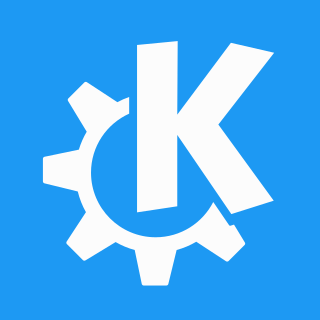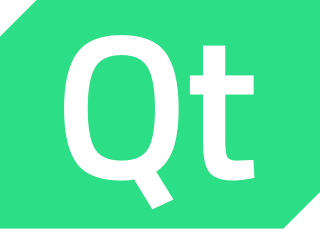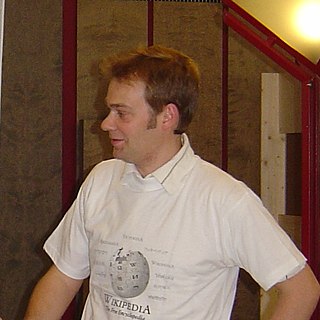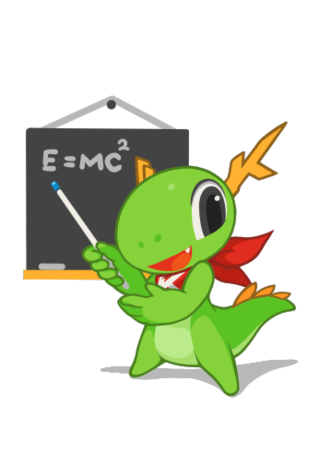KDE is a free software development community.
Contents
KDE may refer to:
KDE is a free software development community.
KDE may refer to:
KDE)kde)
KDE is an international free software community that develops free and open-source software. As a central development hub, it provides tools and resources that enable collaborative work on its projects. Its products include the Plasma Desktop, KDE Frameworks, and a range of applications such as Kate, digiKam, and Krita. Some KDE applications are cross-platform and can run on Unix and Unix-like operating systems, Microsoft Windows, and Android.
Konqueror is a free and open-source web browser and file manager that provides web access and file-viewer functionality for file systems. It forms a core part of the KDE Software Compilation. Developed by volunteers, Konqueror can run on most Unix-like operating systems. The KDE community licenses and distributes Konqueror under GNU GPL-2.0-or-later.

Qt is a cross-platform application development framework for creating graphical user interfaces as well as cross-platform applications that run on various software and hardware platforms such as Linux, Windows, macOS, Android or embedded systems with little or no change in the underlying codebase while still being a native application with native capabilities and speed.

Matthias Ettrich is a German computer scientist and founder of the KDE and LyX projects.
Kopete is a multi-protocol, free software instant messaging client released as part of the KDE Software Compilation. Although it can run in numerous environments, it was designed for and integrates with the KDE Plasma Workspaces. Kopete was started because ICQ blocked Licq from their network in 2001. According to the original author, Duncan Mac-Vicar Prett, the name comes from the Chilean Spanish word copete, meaning "a drink with your friends". Kopete has been nominated for multiple awards. The designated successor is KDE Telepathy from the KDE RTCC Initiative.

The GNU Project is a free software, mass collaboration project announced by Richard Stallman on September 27, 1983. Its goal is to give computer users freedom and control in their use of their computers and computing devices by collaboratively developing and publishing software that gives everyone the rights to freely run the software, copy and distribute it, study it, and modify it. GNU software grants these rights in its license.

Scanner Access Now Easy (SANE) is an open-source application programming interface (API) that provides standardized access to any raster image scanner hardware. The SANE API is public domain. It is commonly used on Linux.

JuK is a free software audio player by KDE, the default player since K Desktop Environment 3.2. JuK supports collections of MP3, Ogg Vorbis, and FLAC audio files.
Amarok is a free and open-source music player for Linux, macOS, Windows, and other Unix-like operating systems. Amarok is part of the KDE project, but it is released independently of the central KDE Software Compilation release cycle. Amarok is released under the terms of the GPL-2.0-or-later.
Kontact is a personal information manager and groupware software suite developed by KDE. It supports calendars, contacts, notes, to-do lists, news, and email. It offers a number of inter-changeable graphical UIs all built on top of a common core.
Karbon is a vector graphics editor. It is a component of Calligra Suite, an integrated graphic art and office suite by KDE. The name is a play on KDE and the radioactive isotope Carbon-14.
A desktop environment is a collection of software designed to give functionality and a certain look and feel to an operating system.

Kdenlive is a free and open-source video editing software based on the MLT Framework, KDE and Qt. The project was started by Jason Wood in 2002, and is now maintained by a small team of developers.

The KDE Education Project develops free educational software based on the KDE technologies for students and parents. These educational software is translated into more than 65 languages, so that users can access them without any problems. The KDE-Edu project also provides free software educational to support and facilitate teachers in planning lessons.

K Desktop Environment 1 was the inaugural series of releases of the K Desktop Environment. There were two major releases in this series.
KDE Partition Manager is a disk partitioning application originally written by Volker Lanz for the KDE Platform. It was first released for KDE SC 4.1 and is released independently of the central KDE release cycle. After the death of Volker Lanz in April 2014, Andrius Štikonas continued the development and took over as the maintainer.

The KDE Software Compilation was an umbrella term for the desktop environment plus a range of included applications produced by KDE. From its 1.0 release in July 1998 until the release of version 4.4 in February 2010, the Software Compilation was simply known as KDE, which stood for K Desktop Environment until the rebrand. The then called KDE SC was used from 4.4 onward until the final release 4.14 in July 2014. It consisted of the KDE Plasma 4 desktop and those KDE applications, whose development teams chose to follow the Software Compilation's release schedule. After that, the KDE SC was split into three separate product entities: KDE Plasma, KDE Frameworks and KDE Applications, each with their own independent release schedules.
Matthias Kalle Dalheimer is a published author and software consultant from Sweden. He ported the StarOffice office suite to Linux and he was one of KDE’s first contributors. In August 2002 he was elected as president of KDE e.V.

Adriaan de Groot is a researcher in software quality and formal verification. He has lived in Nijmegen, Netherlands since 1990. He is a KDE developer, member of KDE e.V. board and coordinator of KDE Netherlands.

Garuda Linux is a Linux distribution targeted towards gaming based on Arch Linux. It is available in multiple desktop environments, but the KDE Plasma version is the main one. The term Garuda, originating from Hinduism and Buddhism, is defined as a divine eagle-like sun bird and the king of birds.